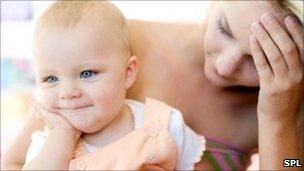Figures show a fall in pregnancy rates among under-18s
- Published

The rate of teenage pregnancies has fallen after hitting a high in the 1990s
Pregnancies in girls under 18 in England and Wales have fallen to levels not seen since the early 1980s, according to new government figures.
The rate of conceptions in under-18s in 2009 fell by nearly 6% compared to the previous year.
The total number of pregnancies in 2009 increased very slightly after a small fall the previous year.
The figures - from the Office for National Statistics (ONS) - are estimates for 2009.
The rate of pregnancy among under 18s, which takes account of fluctuations in population, fell to 38.3 conceptions per 1,000 women aged 15-17.
The actual number of conceptions in under 18s was 38,259 compared with 41,361 in 2008, a decline of 7.5%.
Nearly half of these conceptions led to abortions.
The figures will give some encouragement to policy makers and health workers who have struggled to bring down teenage pregnancy rates after they hit a high in the early 1990s.
But they still fall well short of a target set by the previous Labour government in 1998, now abandoned by the Coalition, to cut teenage pregnancies by 50% by 2010.
The Children's Minister Sarah Teather welcomed the fall in the teenage pregnancy rate but said there was still much to do.
"Teenage parents and their children are more likely to suffer from poor health, unemployment and poor achievement at school than their peers.
"There remains a huge variation in the progress that has been made in reducing teenage pregnancy rates across the country. Some local authorities have seen their rates decline by up to 45% while others have struggled.
"It is important, therefore, that local areas learn from each other and share what has worked, so that they invest in the things that will really make a difference."
A spokesman for the Welsh Assembly Government said would not be complacent and would work to drive down the rate of teenage pregnancies even further.
"Our Sexual Health Action Plan aims to reduce teenage pregnancies further and improve sexual health. The plan highlights the importance of prevention, education, individual responsibility, and access to healthcare services, when required.
"Our revised Personal and Social Education Framework, which has been introduced in schools and colleges, also aims to develop self-esteem and self-awareness, while empowering young people to explore the many aspects of sexuality and healthy personal relationships."
Simon Blake, National Director of the Brook Advisory Centres which are the biggest providers of sexual health services and advice to under 25s, says the fall in the figures reflect a lot of good work over the last 10 years.
"We strongly urge the government to ensure a continued local and national focus on teenage pregnancy as we know that if we stop focusing on delivering sexual health services the rates will go up.
"In times of public spending cuts, making cuts to sexual health services is short sighted as this is crucial to young people's wellbeing and actually saves money - for every £1 spent on contraception £11 is saved."
Julie Bentley, Chief Executive of the Family Planning Association, also believes today's figures should be welcomed, but sounds a note of caution.
"The success brought about by today's figures revealing we're seeing the lowest teenage pregnancy in England and Wales for 30 years is down to a dedicated strategy in England with a tried and tested formula of sex and relationships education, contraception and information services and local services working together.
"However, the fact that the strategy no longer exists is a significant cause for concern and so the government must examine how to keep this tremendous momentum going."
The figures from the ONS also show a very small rise - less than one per cent - in the overall conception rate, compared to a similar fall in the previous year.
In terms of age, women aged 30-34 and 35-39 saw the largest percentage increase in conceptions - 3.5% and 3.4% respectively.
Confirmed figures for 2009 will be issued by the ONS in the autumn.
- Published14 December 2010
- Published14 October 2010
- Published9 July 2010